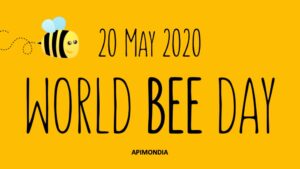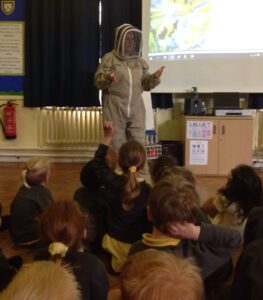
What is World Bee Day?
World Bee Day is celebrated globally on May 20th. The purpose of this day is to recognise the positive impact that bees have on our ecosystem. This year, World Bee Day highlights and confronts the negative impact that the pandemic has had on the beekeeping industry globally.
Why are bees so important?
One third of the world’s food production depends on bees. We know that pollination is a necessary process that needs to occur to help crops grow, but did you know that bees pollinate 75% of all leading global crops? Bees are vital in providing the balance between human beings, plants, animals, and the environment!
Today, the United Nation says that Bees have become increasingly endangered, with one million species facing extinction. That would mean far fewer apples, soft fruits, beans, tomatoes and more.
Mrs Bence, came to talk to Reception all about bees as she has her own hive. She wore her suit to show us and talked to us about how she cares for her bees.

The children loved learning lots of different fact about bees and were able to ask questions too, for example “Does the suit stop you getting stung?” – Rafe
“Yes and I have covers for my shoes. Sometimes I have to give the bees medicine so I need to wear a special suit” – Mrs Bence
We asked the children later in the afternoon what they had remembered. These are some of their responses:
“The Queen Bee stays in the hive” – Liya
“The girls kick the boy bees out of the hive- they don’t do anything, but eat!” – Seb
“Don’t pick flowers, bees need them!” – Luna
“The queen bee can sting without dying” – Emily
“The queen lay eggs, then the eggs hatch and the babies come out. They fight and whoever wins becomes the next queen” – Wiola
In Art we have been learning to use powder paint using the three d’s:
- dip in the water
- dab in the paint
- doodle on the paper
So we drew and painted bees and here are a selection of the results!
(Children in Reception will be learning to ‘Explore, use and refine a variety of artistic effects to express their ideas and feelings’, Development Matters, 2021)
So how can we help?
- Planting bee-friendly plants like daisies and red clover may help bring more bees to your area.
- Leaving a small dish with a few pebbles and water can help out thirsty bees.
- If you maintain a garden, lower or completely cut out the usage of pesticides as they can harm bees.
- Support your local beekeepers by buying their honey and other hive products
(Children in Reception will be ‘Learning to explore the natural world around them’, Development Matters 2021).
Inspiring and educating our children about the importance of bees is the best way we can help protect this amazing creature. Happy World Bee Day!







